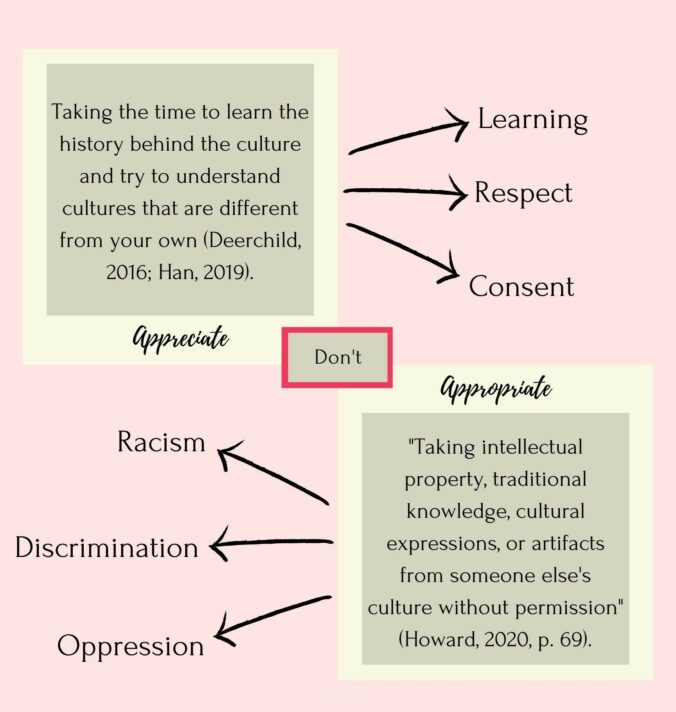What is cultural appropriation? Cultural appropriation is “taking intellectual property, traditional knowledge, cultural expressions, or artifacts from someone else’s culture without permission” (Howard, 2020, p. 69). By contributing to cultural appropriation, people are adding onto the years of oppression and hate the marginalized group has experienced, which may contribute to more racism, prejudice, and discrimination (Deerchild, 2016; Howard, 2020). By practicing cultural appropriation, especially in front of a classroom, you are demonstrating “oppressive behaviour and a lack of respect”, making is seem like appropriation is okay and tolerated (Howard, 2020, p. 69). Cultural appropriation exploits the culture of a marginalized group, it is often overlooked since it is a white person doing it and they have more power as they have been oppressors for centuries (Howard, 2020). Cultural appropriation also relates to the idea of patriotism (Origin of Everything, 2019). Although someone may not actively be participating in patriotism when they are appropriating someone’s culture, they are enacting their power in privilege in thinking they can use someone else’s culture (Origin of Everything, 2019).
For example, under the Indian Act, Indigenous peoples were restricted since they were banned from “conduct[ing] cultural and spiritual ceremonies and wear[ing] traditional outfits” (John Simpson & Filice, 2016, “Prohibitive Legislation” section). However, today when you go to different music festivals or stores, you can see people selling Indigenous styled clothing and accessories (Deerchild, 2016). This is especially harmful since the oppressors that originally took away their traditional clothing are now wearing it when they do not know the history and traditions behind it. As well, in the First Peoples’ Principles of Learning (n.d.), they note that “learning involves recognizing that some knowledge is sacred and only shared with permission and/or in certain situations” when someone appropriates Indigenous culture, they are not learning the history or steps someone must go through to wear traditional clothing or spiritual items (FNESC, n.d.; Deerchild, 2016). Some of this information it also sacred, and not meant to be shared with the public.
On the other hand, cultural appreciation is when someone takes the time to learn the history behind the culture and try to understand cultures that are different from your own (Deerchild, 2016; Han, 2019). When practicing cultural appreciation, there is mutual respect shown to the culture (Deerchild, 2016; Han, 2019). When teaching cultural appreciation, teachers need to think about why we are teaching culture this way (Han, 2019)? And what is the meaning and history behind these symbols or traditions (Han, 2019)?
Can cultural appreciation be appropriation? No, but even though someone has the intent of appreciation does not mean it came across that way (Uuka, 2019). It does not matter if someone had the intent on appreciating the culture, if they do it in a way that offends the community, it is considered appropriation. Going back to the example of Keziah Daum and her prom dress. From what I can gather, she had good intentions on wearing the dress and honouring Chinese culture. However, when people saw this, they were not impressed. This could be because Daum appears like a white settler in America. She would not know the culture and history behind the dress and is just wearing it since it is looked cute and trendy. Whereas Chinese people have been struggling for years to be accepted and embrace their culture in America without being harassed. For Daum to wear the dress without considering the history, she may be appropriating Chinese culture since it is much easier for a person who appears white to wear the dress and get away with it, than a Chinese person wearing it and not being harassed. Although it could be seen as a tribute to the cultures that were discriminated against, it cannot honour their community if “the group in power…maintains power and privilege over another group” (Howard, 2020, p. 69).
Unfortunately, it is not enough to appreciate a culture and learn about students’ heritage (Gorski, 2008). Instead, we need to teach students the history behind these practices and emphasize why we cannot do certain things (Gorski, 2008). By glossing over the history of the marginalized culture, we are unintentionally supporting the oppression that led to cultures being ridiculed for centuries (Gorski, 2008). When we teach Social Studies or cultures in general, we need to actively take down the social order that allowed the mistreatment of different groups (Gorski, 2008). To become intercultural educators, teachers need to shift their mindset into an activist that is able to raise questions and inform students rather than continuing with what they are comfortable teaching (Gorski, 2008). Interrupting culture education that has gone on for centuries will be uncomfortable, but students need to learn appropriating and misusing culture is not acceptable and continues to perpetuate stereotypes about the marginalized culture (Howard, 2020).
References
Deerchild, C. [CBC]. (2016, October 27). Cultural appropriation vs. Appreciation | CBC radio | CBC [Video]. YouTube. https://www.youtube.com/watch?v=vfAp_G735r0&feature=youtu.be
FNESC. (n.d.). First peoples’ principles of learning [Poster]. http://www.fnesc.ca/wp/wp-content/uploads/2015/09/PUB-LFP-POSTER-Principles-of-Learning-First-Peoples-poster-11×17.pdf
Gorski, P. C. (2008). Good intentions are not enough: A decolonizing intercultural education. Intercultural Education, 19(6), 515–525. https://doi.org/10.1080/14675980802568319
Han, H. C. S. (2019). Moving from cultural appropriation to cultural appreciation. Art Education, 72(2), 8–13. https://doi.org/10.1080/00043125.2019.1559575
Howard, K. (2020). Equity in music education: Cultural appropriation versus cultural Appreciation—Understanding the difference. Music Educators Journal, 106(3), 68–70. https://doi.org/10.1177/0027432119892926
John Simpson, M., & Filice, M. (2016, April 7). History of powwows. The Canadian Encyclopedia. Retrieved 1 December 2021, from https://www.thecanadianencyclopedia.ca/en/article/history-of-powwows
Origin of Everything. (2019, January 8). What is cultural appropriation? [Video]. YouTube. https://www.youtube.com/watch?v=VQgF1f557YY
Uuka, R. [Resolutions Northwest]. (2019, September 16). Impact vs intent by nyanga uuka [Video]. YouTube. https://www.youtube.com/watch?v=bBMWkHHAkN8&feature=youtu.be

Leave a Reply